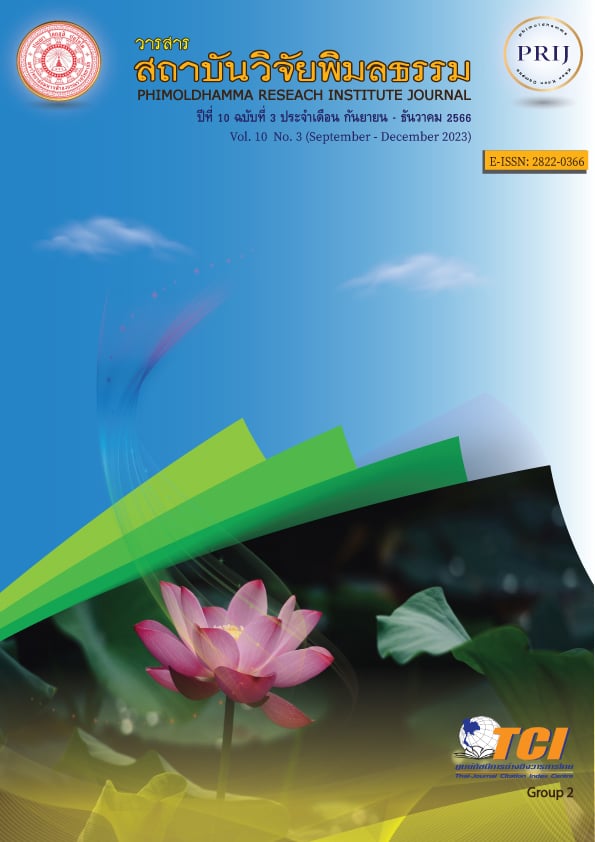Learning Management According to The Four Noble Truths, Social Studies, Religion and Culture, Phrapariyatthamma School General Education Department Prapassorn Wittaya School, Wat Si Nuan, Khon Kaen Province
Keywords:
Learning Management, Four Noble Truths,Abstract
The objectives of this research were as follows: 1) to study the learning management condition; 2) to compare learning management categorized by grade point average, age, and class level; 3) to propose a guideline for learning management according to the Four Noble Truths on the Learning Area of Social Studies, Religion and Culture in Phrapariyattidhamma School, Department of General Education of Prapassorn Wittaya School, Si Nuan Temple, Khon Kaen Province. The population was 160 lower secondary school students from Prapassorn Wittaya School, Wat Sri Nuan 78 of those were selected by simple random sampling as samples. There were nine key informants. The research tool was a questionnaire and an interview form. Statistics used for data analysis were: percentage, standard deviation, one-way variance, and F-test (One-way ANOVA). The obtained data were analyzed by using contextual content analysis.
The research results were as follows:
1) The overall learning management condition of learning management according to the Four Noble Truths on the Learning Area of Social Studies, Religion and Culture in Phrapariyattidhamma School, Department of General Education of Prapassorn Wittaya School, Si Nuan Temple, Khon Kaen Province was statistically rated at a high level in all studied aspects ( = 4.04, S.D. = 0.37).
2) The comparative results of learning management according to the Four Noble Truths classified by grade point average, age, and class level showed no significant difference in performance at the level of 0.05, which was inconsistent with the set hypothesis.
3) The guideline for learning management according to the Four Noble Truths on the Learning Area of Social Studies, Religion, and Culture in Phrapariyattidhamma School, Department of General Education of Prapassorn Wittaya School, Si Nuan Temple, Khon Kaen Province was that in term of Dukkha, students should be able to learn to identify problems in their studies and be able to solve problems in their studies. In terms of Samudaya, they should organize a variety of learning to stimulate students to learn. In terms of Nirodha, teachers should teach students to think analytically and a step-by-step thinking principle. In terms of Magga, teachers should raise awareness and teach students to solve problems rationally.
Keywords: Learning Management, Four Noble Truths,
References
กระทรวงศึกษาธิการ. (2556). หลักสูตรการศึกษาขั้นพื้นฐาน พุทธศักราช 2544. กรุงเทพฯ: องค์การรับส่งสินค้าและพัสดุภัณฑ์.
พระครูปลัดศักดิ์ มหาวีโร (โกศลสุภวัฒน์). (2563). รูปแบบการจัดการเรียนการสอนตามหลักอริยสัจ 4 สำหรับนักเรียนประถมศึกษาในโรงเรียนสังกัดกรุงเทพมหานคร. (วิทยานิพนธ์ครุศาสตรมหาบัณฑิต). พระนครศรีอยุธยา: มหาวิทยาลัยมหาจุฬาลงกรณราชวิทยาลัย.
พระรุ่งโรจน์ ถิรปุญโญ (รักราษฎร์). (2563). ผลของการจัดกิจกรรมการเรียนรู้แบบอริยสัจ 4 ที่มีต่อความสามารถในการคิดอย่างมีวิจารณญาณ และผลสัมฤทธิ์ทางการเรียนของนักเรียนระดับมัธยมศึกษาปีที่ 3. (วิทยานิพนธ์ครุศาสตรมหาบัณฑิต). พระนครศรีอยุธยา: มหาวิทยาลัยมหาจุฬาลงกรณราชวิทยาลัย.
พระกฤษณะ วชิรญาโณ (วภักดิ์เพชร). (2560). การจัดการเรียนการสอนกลุ่มสาระสังคมศึกษา ศาสนา และวัฒนธรรม ในการส่งเสริมคุณธรรมจริยธรรมแก่นักเรียนมัธยมศึกษาตอนปลาย ในเขตเทศบาลนครอุดรธานี. (วิทยานิพนธ์พุทธศาสตรมหาบัณฑิต). พระนครศรีอยุธยา: มหาวิทยาลัยมหาจุฬาลงกรณราชวิทยาลัย.
พระมหาประเสริฐ ชาตเมธี (โนไธสง). (2561). การใช้วิธีสอนแบบอริยสัจสี่ในสาระพระพุทธศาสนา นักเรียนชั้นประถมศึกษาปีที่ 6 โรงเรียนบ้านหลักร้อย จังหวัดนครราชสีมา. (วิทยานิพนธ์พุทธศาสตรมหาบัณฑิต). พระนครศรีอยุธยา: มหาวิทยาลัยมหาจุฬาลงกรณราชวิทยาลัย.
พรวิไล สุขมาก. (2564). ประสิทธิผลของการจัดการเรียนรู้แบบอริยสัจ 4 ผสมผสานวัฒนธรรมทางวรรณศิลป์ไทยสำหรับนักศึกษามหาวิทยาลัยเทคโนโลยีพระจอมเกล้าพระนครเหนือ. การประชุมวิชาการระดับชาติ ครั้งที่ 11 ด้านสังคมศาสตร์และมุนษยศาสตร์ ศึกษาศาสตร์ การจัดการ และศิลปะ, 30 เมษายน 2564, (หน้า 74- 84). กรุงเทพฯ: มหาวิทยาลัยรังสิต.
วาสนา จินดาสวัสดิ์ และคณะ. (2564). นวัตกรรมการเรียนการสอนตามหลักอริยสัจ 4. วารสารภาวนาสารปริทัศน์, 1(2), 41-52.
วันศิริ ก่อเกียรติอาภา. (2561). การจัดการเรียนรู้ตามหลักอริยสัจ 4 โดยใช้โครงงานเป็นฐานสำหรับนักเรียนชั้นประถมศึกษาปีที่ 6 โรงเรียนอนุบาลหนองป่าครั่ง อำเภอเมือง จังหวัดเชียงใหม่. (วิทยานิพนธ์ศาสนศาสตรมหาบัณฑิต). นครปฐม: มหาวิทยาลัยมหามกุฏราชวิทยาลัย.
Devi, K. S., Lakshmi, V. V. & Aparna, M. (2020). Moodle-An Effective Learning Management System for 21 st Century Learners. Alochana Chakra Journal, 9(6), 4474-4485.
Joyce, B., et al. (2009). Model of Teaching. (8th ed.). New York: Allyn and Bacon.
Sumitha. P and Siva Prasadh, R. (2022). Learning Styles of Secondary School Students. Journal of Positive School Psychology, 6(8), 9088-9099.






